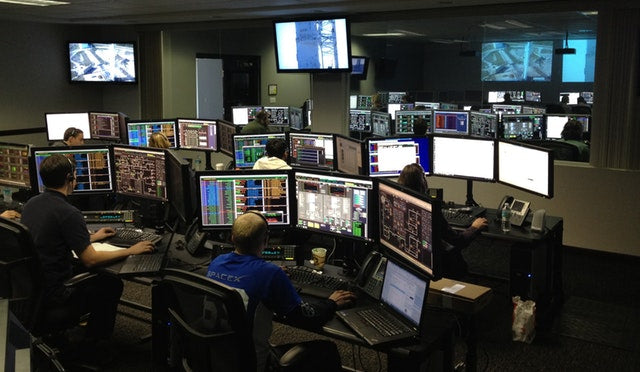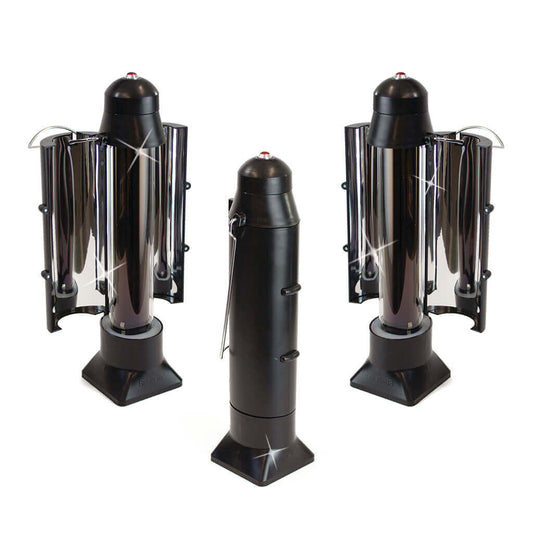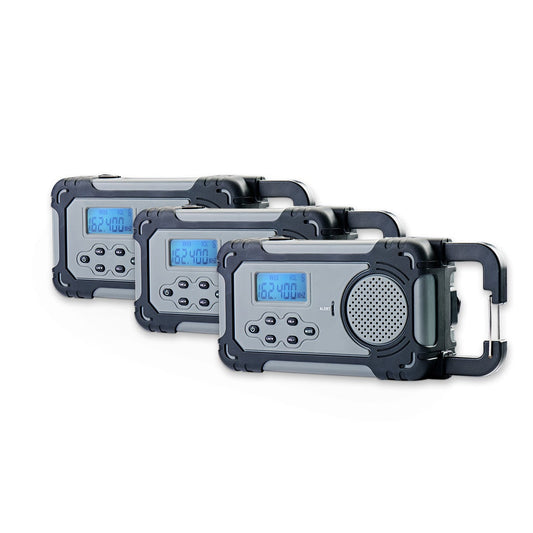
President Trump's Space Force Becomes a Reality

A while back I wrote about President Donald Trump's plan to create a Space Force as the sixth branch of the U.S. military.
A number of readers commented on the idea. About 50 percent of you were for it and 50 percent were against it.
Some of those in favor said it's a long-overdue strategic idea. And that it may be just the thing to keep us ahead of our enemies.
Those against the idea said that those funds can be better spent elsewhere. One of you even suggested that we send Trump up into space instead.
Controlling the Ultimate High Ground
Regardless of what any of us thinks about the idea, it has happened. And it's even taking big steps forward. Trump's recently signed the 2020 National Defense Authorization Act to establish the U.S. Space Force (USSF) as an official armed forces branch.
Here's what the president had to say during the signing ceremonies at Joint Base Andrews in Maryland.
"It was nearly half a century from Kitty Hawk to the creation of the Air Force," he said. "And now it's 50 years after Apollo 11 that we create the Space Force."
He added, "Amid grave threats to our national security, American superiority in space is absolutely vital. The Space Force will help us deter aggression and control the ultimate high ground."
Headquartered at the Pentagon
The USSF is the first new military branch created since the U.S. Air Force in 1947. Approximately 16,000 Air Force active duty and civilian personnel will be assigned to this branch.
Like the Army, Navy, Air Force and Marine Corps, the Space Force will be headquartered at the Pentagon in Washington, D.C.
And similar to the Marine Corps, which is part of the Navy but has its own seat on the Joint Chiefs, the USSF will be part of the Air Force.
USSF responsibilities will include developing military space professionals and acquiring military space systems. As well as maturing the military doctrine for space power and organizing space forces.
To Do and Not to Do
Of course, there are already U.S. military operations in space. This branch will repackage and elevate these existing military operations.
Todd Harrison directs the Aerospace Security Project at the Center for Strategic & International Studies. He said the USSF "will create a centralized, unified chain of command that is responsible for space."
What will the USSF not do? It will not put U.S. military service members in space.
The new branch will be completely separate from NASA. It will not be responsible for protecting Earth from asteroids. Or aliens, for that matter.
Military Officials on Board
Trump said he will appoint General Jay Raymond as the first Chief of Space Operations.
Other U.S. military officials chimed in with their support of the USSF. They included Barbara Barrett, Secretary of the Air Force, and Mark Milley, Chairman of the Joint Chiefs of Staff. And Mark Esper, Secretary of Defense.
"An agile, lean and technologically advanced force of talented professionals will now singularly focus on protecting our U.S. national interests and security in space," Barrett said.
"Our adversaries are building and developing capabilities to threaten us. So we can no longer take space for granted," Milley said.
"Space has become so important to our way of life, our economy and our national security. We must be prepared as a nation to protect it from hostile actions," Esper said.
Dissenters in Washington
As with our readers, not everyone in Washington believes this is a great idea.
Back when the concept was first floated, here's what Democratic Senator Bill Nelson of Florida tweeted. "Military generals don't want a new military branch. Now is NOT the time to rip the Air Force apart. Too many important missions at stake."
Joan Johnson-Freese is a space security expert at the U.S. Naval War College. Originally she called Trump's vision for the USSF as "clear as mud."
Now that the vision has been clarified, she's on board with the idea. But she frowns on Trump's description of the branch as "the world's newest war-fighting domain."
Nixing the War Talk
"When the United States starts chest-thumping, all that does is prompt others to do the same," she said.
"And to bolster their capabilities, which in the long run can be counterproductive to the United States."
Johnson-Freese also pointed out that if there ever were a war conducted in space, the USSF would not be the branch fighting it.
Instead, it would be a separate joint command established earlier in 2019 called the U.S. Space Command.
What Do You Think?
As promised, I want to give you an chance to weigh in on this new armed services branch.
Are you in favor of its creation? Do you believe the benefits will outweigh the costs?
Let me know your thoughts in the comments section below. As always, let's keep it civil and respect each other's opinions.
Featured Products
- Regular price
- From $799
- Regular price
-
- Sale price
- From $799
- Unit price
- per
- Regular price
- $249
- Regular price
-
- Sale price
- $249
- Unit price
- per
- Regular price
- $2,497
- Regular price
-
$3,194 - Sale price
- $2,497
- Unit price
- per
- Regular price
- $2,499
- Regular price
-
$2,994 - Sale price
- $2,499
- Unit price
- per
- Regular price
- From $29.95
- Regular price
-
$119.80 - Sale price
- From $29.95
- Unit price
- per
- Regular price
- $2,499
- Regular price
-
- Sale price
- $2,499
- Unit price
- per
- Regular price
- $499
- Regular price
-
- Sale price
- $499
- Unit price
- per
- Regular price
- $29
- Regular price
-
- Sale price
- $29
- Unit price
- per
- Regular price
- $2,796
- Regular price
-
- Sale price
- $2,796
- Unit price
- per
- Regular price
- $29.95
- Regular price
-
- Sale price
- $29.95
- Unit price
- per
- Regular price
- $97
- Regular price
-
- Sale price
- $97
- Unit price
- per
- Regular price
- $4,999
- Regular price
-
- Sale price
- $4,999
- Unit price
- per
- Regular price
- $49.95
- Regular price
-
- Sale price
- $49.95
- Unit price
- per
- Regular price
- From $69
- Regular price
-
- Sale price
- From $69
- Unit price
- per
- Regular price
- $201
- Regular price
-
- Sale price
- $201
- Unit price
- per
- Regular price
- From $90.97
- Regular price
-
$129.95 - Sale price
- From $90.97
- Unit price
- per
- Regular price
- $999
- Regular price
-
- Sale price
- $999
- Unit price
- per
- Regular price
- $29.95
- Regular price
-
- Sale price
- $29.95
- Unit price
- per
- Regular price
- From $29.50
- Regular price
-
$30.99 - Sale price
- From $29.50
- Unit price
- per
- Regular price
- $129
- Regular price
-
- Sale price
- $129
- Unit price
- per
- Regular price
- From $27
- Regular price
-
$399.80 - Sale price
- From $27
- Unit price
- per
- Regular price
- $3,494
- Regular price
-
- Sale price
- $3,494
- Unit price
- per
- Regular price
- From $199
- Regular price
-
$205.50 - Sale price
- From $199
- Unit price
- per
- Regular price
- $99.95
- Regular price
-
- Sale price
- $99.95
- Unit price
- per
- Regular price
- $29.95
- Regular price
-
- Sale price
- $29.95
- Unit price
- per
- Regular price
- $8.99
- Regular price
-
$29.95 - Sale price
- $8.99
- Unit price
- per
- Regular price
- $99.95
- Regular price
-
- Sale price
- $99.95
- Unit price
- per
- Regular price
- $29.95
- Regular price
-
- Sale price
- $29.95
- Unit price
- per
- Regular price
- $59.95
- Regular price
-
- Sale price
- $59.95
- Unit price
- per
- Regular price
- $11.98
- Regular price
-
$29.95 - Sale price
- $11.98
- Unit price
- per
- Regular price
- $44.95
- Regular price
-
$44.95 - Sale price
- $44.95
- Unit price
- per
- Regular price
- $24.95
- Regular price
-
$49.95 - Sale price
- $24.95
- Unit price
- per
- Regular price
- $114.95
- Regular price
-
- Sale price
- $114.95
- Unit price
- per
- Regular price
- $189
- Regular price
-
- Sale price
- $189
- Unit price
- per
- Regular price
- $499
- Regular price
-
- Sale price
- $499
- Unit price
- per
- Regular price
- $59.95
- Regular price
-
- Sale price
- $59.95
- Unit price
- per
- Regular price
- $39.95
- Regular price
-
- Sale price
- $39.95
- Unit price
- per
- Regular price
- $59.95
- Regular price
-
- Sale price
- $59.95
- Unit price
- per
- Regular price
- $19.95
- Regular price
-
- Sale price
- $19.95
- Unit price
- per
- Regular price
- $99.95
- Regular price
-
- Sale price
- $99.95
- Unit price
- per
- Regular price
- $69
- Regular price
-
- Sale price
- $69
- Unit price
- per
- Regular price
- $14.27
- Regular price
-
$21.95 - Sale price
- $14.27
- Unit price
- per
- Regular price
- $149.95
- Regular price
-
- Sale price
- $149.95
- Unit price
- per
- Regular price
- $79.95
- Regular price
-
- Sale price
- $79.95
- Unit price
- per
- Regular price
- $39.95
- Regular price
-
- Sale price
- $39.95
- Unit price
- per
- Regular price
- $114.95
- Regular price
-
- Sale price
- $114.95
- Unit price
- per
- Regular price
- $39.95
- Regular price
-
- Sale price
- $39.95
- Unit price
- per
- Regular price
- $99.95
- Regular price
-
- Sale price
- $99.95
- Unit price
- per
- Regular price
- $24.95
- Regular price
-
- Sale price
- $24.95
- Unit price
- per
- Regular price
- $24.95
- Regular price
-
- Sale price
- $24.95
- Unit price
- per




















































